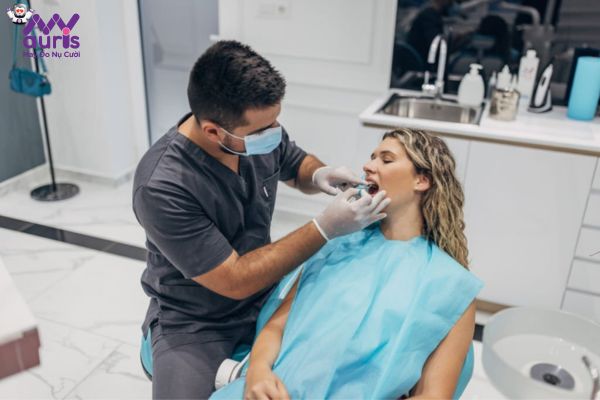Porcelain teeth making is a cosmetic restoration method chosen by many people when they need to fix teeth with many defects such as: Gaps, yellowing, chipped, misaligned teeth, etc. After porcelain crowns, you will feel pain or sensitivity, but the condition will not last too long. So why do I have toothache after getting porcelain teeth? Is there any way to help fix it? In this article, My Auris dentists will help you get the answer.
Why do I have toothache after porcelain crowns?
The method of cosmetic porcelain crowns is becoming more popular day by day and is considered an effective solution to help correct teeth that are yellow, sparse, antibiotic-infected, chipped, etc. In order to increase the durability of porcelain teeth, the doctor needs to grind the surrounding enamel layer at a standard rate, then place the porcelain crown on the real tooth base. However, there have been many cases of toothache after porcelain crowns.

If after getting porcelain teeth pain occurs, it will make you feel uncomfortable, uncomfortable as well as affect your health. If it affects your daily activities, you don’t need to worry too much.
Because this condition only appears in the first 1 to 2 days. However, if you feel the pain persists, immediately contact a specialist for examination and treatment as soon as possible.
Causes of tooth pain after porcelain crowns
Toothache after porcelain crowns can originate from a number of common causes. Doctors at My Auris dentistry will help you summarize some of the main causes:

The patient’s teeth are weak
Before performing porcelain teeth, the doctor will examine the general condition of each patient’s teeth. This is to detect whether you are suffering from gum disease or not. At the same time, it also reminds you of possible painappear after porcelain coating.
Patients who have not been thoroughly treated for pulpitis
Dental pulpitis, if not thoroughly treated by a doctor, is also one of the causes of toothache after porcelain crowns. In some cases, a tooth with pulpitis that is not detected before being covered with porcelain can cause the tooth to quickly become necrotic, affecting the nerves and causing long-lasting pain. On the other hand, the tooth may have to be extracted.
Pain can make you feel uncomfortable, leading to affecting your ability to eat and quickly weakening your body. However, not all cases require root canal treatment. Therefore, choosing a reputable dental facility is a prerequisite to help you avoid dangerous complications after porcelain crowns.
Your gums have not yet adapted
When the doctor installs ceramic crowns, the gums will become quite sensitive and pain may appear. It will take some time for your gums to adapt well. At this point, you will no longer feel like you have a toothache after getting porcelain crowns.
The doctor grinds too many porcelain teeth
If the dentist does not grind teeth at the prescribed rate or does not perform standard grinding operations, it can cause the teeth to be ground too much, exposing the dentin. In addition, if porcelain teeth are not made properly, they will not be able to hug the gums tightly, food residue will stick, causing inflammation and prolonged pain. Porcelain
The condition of having toothache after porcelain teeth can be caused by misaligned bite during the process of installing porcelain teeth. Improper bite correction will cause the porcelain teeth to protrude higher than normal or deviate from the opposing jaw. This causes chewing force to be placed on the porcelain teeth, causing obstruction and pain in the temporomandibular joint.
Prolonged feeling of sensitivity without intervention will dangerously affect the structure of real teeth.
Dental diseases
In addition to root canal treatment, detecting other diseases such as tooth decay, periodontitis, and gingivitis will be very important to limit the situation after root canal treatment. Porcelain teeth hurt. If tooth decay is not treated, when the tooth is covered with porcelain, it will cause bacteria to strongly attack the tooth pulp, causing pulp inflammation and in more severe cases, it can lead to an abscess and serious damage.
Riginated from bad habits

The habit of grinding teeth, if maintained, will cause the opposing teeth to exert strong, continuous impact on the porcelain teeth, so you will feel pain and sensitivity each time you grind your teeth.
Leaking dental glue material
Ceramic tooth glue hardening technology in the dental field will ensure stable and strong adhesion for porcelain teeth. However However, if you have porcelain crowns done at a public dental clinic equipped with modern machines, it can easily affect the liquid glue, leaking out, causing tooth sensitivity and affecting the gums.
The ceramic material is not good
If porcelain teeth are made with poor materials, without a clear origin, then thermal conductivity will definitely not be guaranteed. This will have a negative impact on the tooth pulp when eating hot and cold foods.
Improper nutrition and diet
After porcelain teeth, if you eat foods that are too hard or too chewy, it will also cause tooth pain. If not cleaned thoroughly after eating, bacteria will grow and attack the porcelain teeth.
How to overcome pain?
Toothache after getting porcelain teeth can be improved with some methods right at home. However, if this pain still persists long, with no signs of improvement, you need to go to the dentist for early examination and treatment to minimize unwanted complications.

Using pain relievers
Ibuprofen, Acetaminophen,… are timely pain relievers. However, you should only take them after a doctor’s prescription, avoid arbitrarily.Use affects oral health.
Gargle with salt water
Gargle with saline to remove all bacteria bacteria, cleans the mucus that is still clinging around the teeth. Or you can mix your own salt water to clean your teeth every day.
Use ice packs
A way to temporarily relieve pain time after porcelain teeth. You can put ice in a soft towel and apply it to the area near the painful porcelain tooth. Note, do not apply compresses directly to the porcelain tooth position, because it will make this painful feeling more serious.
Use a mouth guard
If you have a toothache after having porcelain teeth made due to teeth grinding, you need to prepare a tooth protector to avoid the remaining teeth from directly colliding with the porcelain teeth.
To the muscles dental clinic for treatment by a doctor
If pain persists after porcelain crowns, and it is determined that the condition is due to bite misalignment or faulty porcelain crown technique, you must go to the dentist for treatment. In this case, the doctor will prescribe removing the porcelain for adjustment.
Maintain appropriate eating habits and oral hygiene
After successfully making porcelain teeth, the doctor must always instruct you on how to safely clean porcelain teeth and a suitable diet to avoid pain and discomfort. You should maintain brushing your teeth twice a day, combined with dental floss, water flosser, etc.
Hopefully the above information can help you know the causes of toothache after porcelain crowns and how to fix it. Most importantly, you still need to consult and get treatment at reputable dentists to minimize complications. You can refer to My Auris dentistry with a team of highly specialized doctors and modern machines, all of which will help you have the most perfect porcelain teeth.
Yen Nhi





